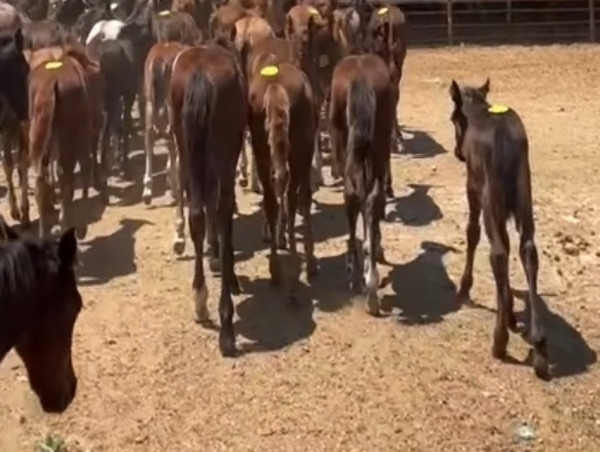LOS ANGELES, CALIFORNIA, UNITED STATES, September 21, 2023 /EINPresswire.com/ -- One day, free range horse families grazed peacefully on Wyoming Tribal Land. The next day, they were gathered by plane and helicopters, run for miles then disbanded from their family groups.
Tribal horses were gathered during foaling season and families were immediately separated into 3 groups, stallions, mares and foals. Around 600 stallions have been reported on social media rescue sites as having been sold to Mexican rodeos for use in horse tripping events, a barbaric and inhumane crippling practice that most often leads to death. It is believed mares were sent straight to slaughter and the foals, ranging in age from 1 week and older, were sent to kill pens across mid-America. Approximately 300 of them were adopted by individuals, rescues and sanctuaries. Many of the very young did not survive the round ups, transportation and kill pens due to dehydration, injury and disease. They were commercialized as weanlings.
The horse slaughter connection to horse tripping, referenced above, is explained in link [2]. An excerpt reads, “One source of horses for leasing to charro rodeos are feedlots. Killer buyers employed by slaughterhouses lease out horses for the charreada circuit to make extra money from them before selling the horses to horse slaughter plants.”
“Before horse tripping was banned in California, a source at a Riverside feedlot reported they leased 25 horses per weekend to two different charro rodeos. Upon their return, approximately 2 to 5 horses per week displayed injuries serious enough that the animals were sent to slaughter. For each horse that went to slaughter, another from the feedlot replaced them on the charro circuit. During that particular season, 75 to 100 horses were leased from that particular lot to the two charro rodeos, but only 2 of the original horses survived until the season’s end.”
The reported slaughter of free-range horses from the Wind River Reservation is a travesty. The horses are an important part of all tribal culture. Horse slaughter is not humane euthanasia, good management or stewardship. The ‘2023 large project’ helping fund removing the horses is sponsored by the Select Natural Resource Funding Committee. Funding plans for this are expected to carry on into 2024. [1]
Freedom of Information Act, FOIA, documents reveal Special Permits were issued for the horses to enter Kansas. A concerned citizen obtained the information. The source expressed concerned about disease(s) transmission. “The purpose of interstate regulations is to provide for quarantine, restriction of movement, maintenance of sanitation, and identification of animals to prevent the spread of animal disease."
Findings from an Animal Angels’ investigation published days ago show the danger of animal diseases spreading. A short segment from the article reads, “In 2018, a kill pen exposed hundreds of horses to Equine Infectious Anemia (EIA), a deadly, highly contagious, incurable disease that affects horses, donkeys, and mules. In November 2022, Judge Tierney M. Carlos determined that this individual was responsible for shipping a horse infected with EIA across state lines along with fifty other horses who had been in contact with the EIA-positive horse.”
“As a result of this action, 293 horses in twelve states were potentially exposed to EIA, while state and federal officials had to spend hundreds of hours trying to locate the animals in question. Sixty-seven of these horses could never be traced, which means they could still be out there spreading the deadly disease. In the end, the judge ordered the livestock company to pay a hefty $210,000 civil penalty for violation of the Animal Health Protection Act and the Commercial Transport of Equines to Slaughter Regulation.” [3]
Many Americans don’t know ending horse slaughter is a top issue in Congress every budget cycle. February 2023 was the 21st anniversary of proposed Federal legislation written to protect horses from slaughter for human consumption. The equine protection community works to overcome powerful and monied special interest groups affecting equine policy at the Federal level. “A special interest group can pressure legislators to enact public policies that do not benefit society as a whole. They exert a disproportionate effect on political outcomes”- Lumen Learning. This is the case with the public’s efforts to protect America’s domestic and wild equines from slaughter. Efforts to end slaughter came within a few days of passage in the House of Representatives in 2022.
Cats, dogs and horses live their lives as companion animals in America. The connection between humankind and horses is long. Yet, horses are bought by kill buyers in the United States, then sold as meat animals, after they are transported across the border into Canada and Mexico. The Save America’s Forgotten Equines Act would amend Section 12515 of the 2018 Farm Bill to read dogs, cats and equines.
The United States Congress has an opportunity to protect American horses from the brutal horse-meat trade. The Act would amend the Agriculture Improvement Act of 2018 to prohibit the slaughter of equines for human consumption.
The public can help protect all of America’s equine. It’s easy to do. Call on your federal lawmakers. Ask them to support and co-sponsor and support the ‘Save America’s Forgotten Equines Act’, the SAFE Act. It only takes a few minutes to make the call and help American wild and domestic horses, burros and donkeys. Senate and Representative contact information is shown below.
Learn more about protecting America’s equines at SANECAMPAIGN.ORG. Readers can sign up to participate in the digital One Click Advocacy Movement on their website.
Bill numbers: House bill H.R. 3475 & Senate bill S.B. 2037
These links provide lawmaker contact information:
House of Representatives https://www.house.gov/representatives.
https://www.govtrack.us/congress/bills/118/hr3475/text
United States Senate https://www.senate.gov/senators/senators-contact.htm.
https://www.congress.gov/bill/118th-congress/senate-bill/2037/text
[1] Funding - https://wyoleg.gov/InterimCommittee/2022/SNR-2022122023LSO-0208_V0.4-2023LargeProjectsBill.pdf
[2] Horse Tripping - https://fundforhorses.org/fact-sheets/horse-tripping-fact-sheet/
[3] Investigation - https://www.animalsangels.org/investigations/horses/fabrizius-feedlot-investigation-co
*******
American Equine Awareness and 5900 Club provided this news piece.
AEA Advocacy News & 5900 Club
American Equine Awareness
[email protected]






